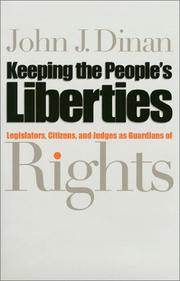| Listing 1 - 1 of 1 |
Sort by
|

ISBN: 0700630856 0700609059 Year: 1998 Publisher: University Press of Kansas
Abstract | Keywords | Export | Availability | Bookmark
 Loading...
Loading...Choose an application
- Reference Manager
- EndNote
- RefWorks (Direct export to RefWorks)
Which branch of government should be entrusted with safeguarding individual rights? Conventional wisdom assigns this responsibility to the courts, on the grounds that liberty can only be protected through judicial interpretation of bills of rights. In fact it is difficult for many people even to conceive of any other way that rights might be protected. John Dinan challenges this understanding by tracing and evaluating the different methods that have been used to protect rights in the United States from the founding until the present era.By examining legislative statutes, judicial decisions, convention proceedings, and popular initiatives in four representative states—Massachusetts, Virginia, Michigan, and Oregon—Dinan shows that rights have been secured in the American polity in three principal ways. Throughout the eighteenth and nineteenth centuries, rights were protected primarily through representative institutions. Then in the early twentieth century, citizens began to turn to direct democratic institutions to secure their rights. It was not until the midtwentieth century that judges came to be seen as the chief protectors of liberties.By analyzing the relative ability of legislators, citizens, and judges to serve as guardians of rights, Dinan's study demonstrates that each is capable of securing certain rights in certain situations. Elected representatives are generally capable of protecting most rights, but popular initiatives provide an effective mechanism for securing rights in the face of legislative intransigence, and judicial decisions offer a superior means of protecting liberties in crisis times. Accordingly, rather than viewing rights protection as the peculiar province of any single institution, this task ought to be considered the proper responsibility of all these institutions.By undertaking a comparison of these institutional methods across such a wide expanse of time, Keeping the People's Liberties makes a highly original contribution to the literature on rights protection and provides a new perspective on debates about the contemporary role of representative, populist, and judicial institutions.
Politique et gouvernement --- Pouvoir legislatif --- Pouvoir judiciaire --- Droits civils et politiques --- Pouvoir constituant --- Politics and government. --- Legislative power --- Judicial power --- Constituent power --- Civil rights --- Civil rights. --- Basic rights --- Civil liberties --- Constitutional rights --- Fundamental rights --- Rights, Civil --- Constitutional law --- Human rights --- Political persecution --- Judiciary --- Justiciability --- Power, Judicial --- Courts --- Implied powers (Constitutional law) --- Judicial independence --- Separation of powers --- Power, Legislative --- Judicial review --- États. --- U.S. states. --- States. --- Law and legislation --- United States. --- United States --- Legal history
| Listing 1 - 1 of 1 |
Sort by
|

 Search
Search Feedback
Feedback About
About Help
Help News
News